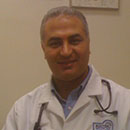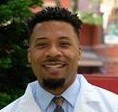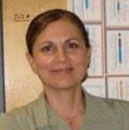Our Mission
The Boston University Thrombotic Microangiopathy Collaborative (BU-TMAC) provides a multidisciplinary approach to the care of patients with TMA. The multidisciplinary team is very unique in its structure and function, involving physicians from different subspecialties with great interest and expertise in managing patients with TMA.
The Collaborative combines basic and clinical research to advance the understanding of the TMA syndromes. We are an integral part of the Affinity Research Collaborative (ARC) on Thrombosis and Homeostasis that consists of investigators from several academic departments with a common goal to investigate thrombosis in humans.
- Evaluation, management, and treatment of patients with TMA.
- To educate other health providers and increase awareness of the TMA syndromes
- Center for clinical trials and basic research on TMA syndromes.
- Role model for the management of patients with TMA through a multidisciplinary team approach.
Award & Recognition

Congratulations to Dr. Francis for receiving the National Kidney Foundation New England Award
– Excellence In Transplant and Nephrology.
Jean Francis, MD
Medical Director of Kidney Transplantation (BUMC)
Associate Professor of Medicine (BUSM)
Medical Director of Pancreas Transplant Program, Brigham and Women Hospital
Associate Physician Brigham and Women Hospital
For more information about the awardee and his project, visit the NKF website
here.
Meet BU-TMAC Team
Clinical Team and TMA Co-Directors
 Dr. Jean Francis
Dr. Jean Francis
Co-Director
Associate Professor (BUSM)
Dept of Medicine
Nephrology
Dr. Mark Sloan
Co-Director
Associate Professor (BUSM)
Dept of Medicine
Hematology & Medical Oncology
 Laurence H. Beck Jr, MD, PhD.
Laurence H. Beck Jr, MD, PhD.
Associate Professor (BUSM)
Dept of Medicine
Nephrology
 Reggie Thomasson, MD
Reggie Thomasson, MD
Assistant Professor (BUSM)
Pathology & Laboratory Medicine
 Justine E. Dickson, PharmD, BCACP
Justine E. Dickson, PharmD, BCACP
Pharmacy Clinical Specialist
Renal Transplant/TMA
Michael R.York, MD
Assistant Professor of Medicine (BUSM)
Rheumatology
Research Team and Consultants
 Dr. Vipul C. Chitalia
Dr. Vipul C. Chitalia
Core Member, TMA Research Program
Associate Professor (BUSM)
Dept of Medicine
Nephrology
Chitalia Lab
Dr. Katya Ravid
Core Member and Consultant, TMA Research Program
Professor of Medicine (BUSM)
Dept of Medicine
Cardiovascular Medicine

Dr. David Salant
TMA and Thrombosis Consultant
Professor (BUSM)
Dept of Medicine
Nephrology
View BU-TMAC Algorithmic Approach to TMA Diagnosis

How to make a diagnosis for TMA
*The information contained on this website is for general information purposes only.
Accelerating the Pathway to Diagnosis Lecture
Patients Frequently Asked Questions
- What types of TMA syndromes do you treat at BU-TMAC?
We have the clinical expertise to manage all types of TMA syndromes. Our team is very well suited to provide exceptional care without exception to all patients with TMA regardless of the underlying etiology. Our scope of expertise covers acute or chronic forms of TMA, and primary or secondary causes of TMA. Please contact our center for an appointment and we will work with you and your doctors to have you meet our team of experts as quickly as possible.
- What will happen on my visit?
We often ask you to send all your medical records before your visit, as this will give us enough time to review your chart and records prior to your first visit. This would allow us to spend more time with you on the day of your visit.
You will meet one or more members of our TMA team on your visit, and the team will meet after your visit to review your chart and all the workup and decide in a multidisciplinary approach on the best plan of your care.
- How do I schedule an appointment at BU-TMAC?
Please contact Dr. Jean Francis at Jean.Francis@bmc.org and Dr. Vipul Chitalia at Vipul.Chitalia@bmc.org for more information. Our staff will arrange for your visit and we will make sure that your appointment is scheduled as quickly as possible
- I already have a physician caring for my TMA, can I still see him? Will you communicate with my other providers?
We are delighted to work with you and your treating physician to achieve the best clinical outcomes. You can see us one time or frequently and on a needed basis while you continue to follow with your doctor/s. We will make sure that all communications are delivered on time. We have a team approach for the management of TMA and we consider you and all your doctors a part of this team. We believe that communication is crucial for the management of TMA cases due to the complexity and the seriousness of the disease.
- What therapeutic options are available to treat my TMA?
We provide a variety of therapeutic options for the management of TMA. The treatment will depend essentially on the underlying cause of your TMA. Our team members are experts in kidney and hematological diseases, and they provide the state of the art treatment for most TMA syndromes.
- What about TMA clinical recruitment?
BMC has been selected as a clinical site for ALEXION-funded (ALXN1210-aHUS-311) single-arm, multi-center clinical trial, which examines the efficacy of the long-acting recombinant anti-C5 humanized monoclonal antibody for atypical HUS. Clinical recruitment will begin soon. Investigators include Drs. Francis, Gordon, and Chitalia.
- For referring physicians
The BU-TMAC is committed to providing a high quality of care without exception to all patients with TMA. Our TMA team has great experience in managing patients with TMA. Our goal is to maintain the highest standards of patient care based on collegiality and continuous communication with referring physicians. Our team members are readily available to respond to referring physician requests and questions at any time via phone, or electronic mail regardless of having seen the patient or not. Our TMA center is involved in TMA clinical trials to keep advancing the understanding, management, and treatment of this complex disease. Please contact Dr. Jean Francis at Jean.Francis@bmc.org and Dr. Vipul Chitalia at Vipul.Chitalia@bmc.org.
Important Publications
- Kamel MH, Jaberi A, Gordon CE, Beck LH, Francis J. The Complement System in the Modern Era of Kidney Transplantation: Mechanisms of Injury and Targeted Therapies. Semin Nephrol. 2022 Jan; 42(1):14-28. https://pubmed.ncbi.nlm.nih.gov/35618392/. View Related Profiles. PMID: 35618392
- Haddad G, Lorenzen JM, Ma H, de Haan N, Seeger H, Zaghrini C, et al. Altered glycosylation of lgG4 lectin complement pathway activation in anti-PLA2R1-associated membranous nephropathy. J Clin Invest. 2021;131(5):e140453. https://www.jci.org/articles/view/140453
- Kamel MH, Yin W, Zavaro C, Francis JM, Chitalia VC. Hyperthrombotic Milieu in COVID-19 Patients. https://pubmed.ncbi.nlm.nih.gov/33142844/. Cells. 2020 10 31; 9(11).View Related Profiles. PMID: 33142844
- Singh P, Chen H, Gordon CE, Ghai S, Sloan JM, Quillen K, Moradi S, Chitalia V, Gautam A, Henderson J, Francis JM. Monoclonal IgG4/2? Deposition Following Eculizumab Therapy for Recurrent Atypical Hemolytic Uremic Syndrome in Kidney Transplantation. https://pubmed.ncbi.nlm.nih.gov/32734194/. Kidney Med. 2019 May-Jun; 1(3):139-143.View Related Profiles. PMID: 32734194
- Reddy YN, Siedlecki AM, Francis JM. Breaking down the complement system: a review and update on novel therapies. https://pubmed.ncbi.nlm.nih.gov/27977428/. Curr Opin Nephrol Hypertens. 2017 Mar; 26(2):123-128. PMID: 27977428; DOI: 10.1097/MNH.0000000000000305
- Gordon CE, Chitalia VC, Sloan JM, Salant DJ, Coleman DL, Quillen K, Ravid K, Francis JM. Thrombotic Microangiopathy: A Multidisciplinary Team Approach. https://pubmed.ncbi.nlm.nih.gov/28720207/. Am J Kidney Dis. 2017 Nov; 70(5):715-721.View Related Profiles. PMID: 28720207














